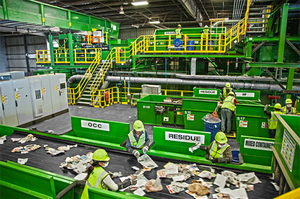Companies prepare workers for record temperatures.
September 1, 2007
CHRIS CARLSON
Summer temperatures rising to record levels across the country have had various effects on waste companies. While many companies offer extra training and preparation for drivers, some have had to change pick-up times in order to beat the heat.
Due to excessive heat in Joplin, Mo., Allied Waste worked together with the city to change the pick-up time to 5 a.m. from the usual 6 a.m. According to a press release, the city said it granted the change to protect Allied drivers but told residents that trash would still be collected even if they couldn't meet the new pick-up schedule. On August 14, Joplin, experienced a record temperature of 103 degrees Fahrenheit, according to the Midwest Regional Climate Center.
The new pick-up times were in place from Aug. 14 to Aug. 17. Mary Anne Phillips, recycling coordinator for the city, says temperatures subsided just enough to not have to extend the altered schedule. “It's still hot, but we didn't have the same heat indexes,” she says. Before the schedule was changed, Phillips said two Allied drivers had to be taken to the hospital for heat-related illness. Both drivers were treated and released.
Despite the fact that there is no corporate training at Allied for dealing with extreme heat, the topic is addressed by local facility or safety managers. Jim Zeumer, senior vice president of public affairs and communications for the firm, says local managers typically hold brief meetings at the start of each shift to review any work topics and remind teams about safe operating procedures. “As temperatures and humidity rise, clearly heat becomes a topic of great importance,” Zeumer says. “We'll remind employees about the need to carry lots of water, to hydrate and also to be aware of the signs that their body might be overheating.”
Other companies have also taken steps to protect their employees and alert them to safety procedures. Rumpke Consolidated Cos., Cincinnati, provides annual training in the spring for its employees. Temperatures surrounding Cincinnati also have been extremely high. According to the National Weather Service, temperatures reached record levels for August and the summer as a whole, with 25 days of at least 90 degrees and five days of at least 100 degrees. For August, the average temperature was 7 degrees above normal.
Specifically, Rumpke's training provides clothing and diet suggestions, a review of emergency procedures, posted heat stress reminders for drivers, meetings with supervisors before days with predicted high temperatures, sports drinks and water before beginning routes and frequent breaks at transfer stations and recycling centers in air-conditioned areas.
Along with its own annual training, Waste Management, Houston, also provides heat stress training to new hires during orientation. Ashley Harris, director of governmental affairs for Waste Management's Southern Group office, says there have been heat-related incidents this summer. “However, it was related to more of an individual health problem,” she adds. The training conducted during the new hire orientation includes teaching workers the signs, symptoms and treatments for heat exhaustion, heat cramps and heat stroke. Drivers and helpers also are taught to be aware of co-workers' activities as an added precaution. “The drivers are instructed to work as a team and match the pace of the helpers,” Harris says. “This is done especially on days when the heat index is high with the humidity.”
Republic Services, Fort Lauderdale, Fla., also provides training to remind its drivers of the dangers of heat illness. Instead of meeting once every spring, employees are given training once every month starting in March and continuing through September. Mike Lambert, director of safety for Republic, says there haven't been any incidents to report this summer and that the total number of incidents has been steadily declining since increasing the training over a seven-month period. “It's too important not to do it every month you have heat issues,” he said. “Once isn't enough for it to sink in.”
You May Also Like


